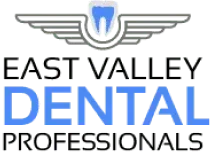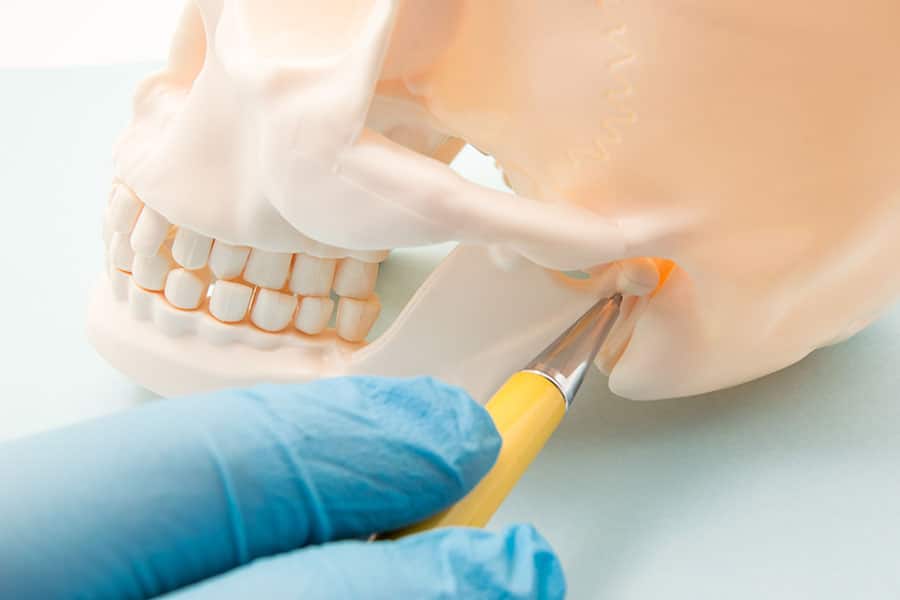TMJ disorder, also known as temporomandibular joint disorder or TMD, can cause pain in the jaw, facial muscles, and in front of the ears. It can also cause headaches and pain when chewing and talking. While the cause of TMD can be difficult to pinpoint, it is usually a temporary issue.
Disorders that affect the temporomandibular joint lead to dysfunction in your jaw joints and the surrounding muscles as well. TMJ inflammation and trauma can be debilitating depending on the cause.
Approximately 10 million Americans are affected by TMD. Women are twice as likely to experience TMD than men, and it is more common for TMD to occur in younger people. If you believe you are suffering from a TMJ disorder, schedule an appointment with our dentist for an examination.
Symptoms of TMJ Disorders
It’s possible to have a TMJ disorder without experiencing pain. Symptoms vary from patient to patient. Depending on how severe your case of TMD is, it may impact how much pain you experience. The following symptoms are commonly experienced in patients with TMJ disorders.
- Earache
- Clicking or popping sounds
- Jaw pain
- Headache
- Pain while talking or chewing
- Tenderness in your jaw or facial muscles
- Difficulty opening or closing your mouth
- Tense or aching jaw muscles
- Ringing in your ears
- Jaw stiffness
- Neck pain
- Changes in your bite, also known as a malocclusion
Causes of TMJ Disorders
There are many reasons why someone may experience TMD, some more serious than others. Some of the most common causes of TMJ disorders are:
- Arthritis
- Stress
- Poor sleep
- Grinding or clenching while sleeping or throughout the day
- Malocclusion
- Bad posture
- Problems with the jaw structure
- Chewing gum often
- Injury or trauma to the joint
- Orthodontic appliances
To diagnose TMD, your dentist may take x-rays of your mouth as well as complete a physical exam of your mouth. Sometimes, symptoms can present themselves as one problem when it’s another issue entirely. Your medical history is vital for a proper diagnosis, so be thorough.
Treatment Options and Pain Relief
TMJ disorders can be extremely painful, depending on the severity. It’s essential to take treatment seriously so you can recover faster. Whether you need medical intervention or simple at-home remedies, there is usually a treatment path for everyone.
Practicing relaxation techniques can provide a significant benefit for TMD sufferers. Stress and pain can go hand in hand. Alleviating stress through meditation, exercise, or deep breathing may give relief to your temporomandibular joint or TMJ.
Warm towels and cold packs can provide pain relief quickly. Wet, warm towels can help relieve muscles and help your mouth relax. If you want to reduce inflammation, cold therapy is a great option as well.
Muscle relaxers may help with more severe cases and can be provided by a doctor or dentist if deemed necessary. Other prescription medications that may be provided are prescription strength anti-inflammatories and analgesics. Sometimes, even low dose antidepressants may be prescribed.
Eliminate hard and chewy foods such as candies, popcorn, gum, raw carrots, etc., from your diet and consume softer foods instead, such as applesauce or soup. Tough foods will only put more stress on your mouth, so it’s best to avoid them, at least until your TMD has resolved.
Breaking certain bad habits can even give TMD sufferers relief. If you’re a chronic nail biter or ice chewer, now is the time to break the habit.
In some cases, you may be prescribed a bite guard. While some bite guards act as splints and can only be used temporarily, our dentist may recommend a custom night guard for you if you find relief using one.
While surgery and medical procedures are rare occurrences for a patient with TMD, these options may be explored by you and your doctor if all other treatment methods fail. Open joint surgery, corticosteroid injections, botox injections, and TMJ arthroscopy are a few procedural options that can help extreme TMD cases.
TMJ Headache Relief
Patients that experience headaches due to TMD can experience significant pain. The good news is, there are many ways to treat TMJ headaches. Changes you can make at home include:
- Reducing stress
- Eliminating chewy foods or hard foods from your diet
- Applying an ice pack to the affected area as needed
- Avoiding biting your nails
If you see a doctor or dentist, they may prescribe you anti-inflammatory medication if they feel it’s necessary for headache relief. They may recommend a splint or bite guard for your mouth as well.
Are you experiencing jaw pain or a symptom of TMD? Our team is here to help. We know how painful TMJ disorders can be and how they can impact your quality of life. Please schedule an appointment with our dentist to learn more and for an oral evaluation.

